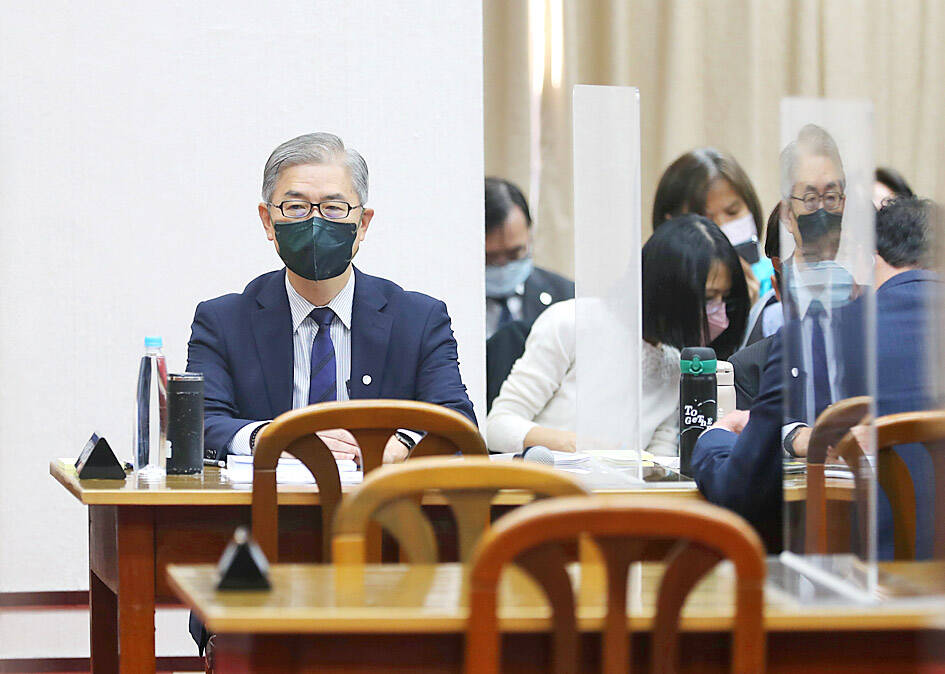Taiwan has no plans to implement a blanket ban on short-selling for the time being, but it would not rule out taking action in the future, Financial Supervisory Commission (FSC) Chairman Thomas Huang (黃天牧) told a meeting of the legislature’s Finance Committee yesterday.
A short-selling ban on stocks that fell 3.5 percent or more in the previous trading session took effect on Monday — unlike previous bans in 1998, 2008 and 2015, which applied to all stocks.
The commission considers factors such as global market movements, geopolitical tensions and inflationary pressure when making decisions on restricting short-selling, Huang said.

Photo: CNA
“Previously, the 2008 global financial crisis prompted the commission to ban short-selling of all stocks. However, we are facing a different situation this time,” he said.
“We still have other tools” to stabilize the local market, Huang said.
Despite solid fundamentals, Taiwanese equities have fluctuated in recent sessions, affected by central banks’ interest rate hikes, a global market rout, soaring inflation and Washington’s chip regulations, he said.
The latest short-selling ban applied to 152 local stocks on Monday and 93 stocks on Tuesday, including several large-cap stocks such as Taiwan Semiconductor Manufacturing Co (TSMC, 台積電) and MediaTek Inc (聯發科).
Yesterday, TSMC shares advanced 1.35 percent to NT$376 and MediaTek rose 2.84 percent to NT$579, Taiwan Stock Exchange data showed.
Foreign investors net sold Taiwanese shares for seven days in a row from Monday last week before buying a net NT$2.76 billion yesterday, Taiwan Stock Exchange data showed.

CHIP RACE: Three years of overbroad export controls drove foreign competitors to pursue their own AI chips, and ‘cost US taxpayers billions of dollars,’ Nvidia said China has figured out the US strategy for allowing it to buy Nvidia Corp’s H200s and is rejecting the artificial intelligence (AI) chip in favor of domestically developed semiconductors, White House AI adviser David Sacks said, citing news reports. US President Donald Trump on Monday said that he would allow shipments of Nvidia’s H200 chips to China, part of an administration effort backed by Sacks to challenge Chinese tech champions such as Huawei Technologies Co (華為) by bringing US competition to their home market. On Friday, Sacks signaled that he was uncertain about whether that approach would work. “They’re rejecting our chips,” Sacks

Taiwan’s exports soared 56 percent year-on-year to an all-time high of US$64.05 billion last month, propelled by surging global demand for artificial intelligence (AI), high-performance computing and cloud service infrastructure, the Ministry of Finance said yesterday. Department of Statistics Director-General Beatrice Tsai (蔡美娜) called the figure an unexpected upside surprise, citing a wave of technology orders from overseas customers alongside the usual year-end shopping season for technology products. Growth is likely to remain strong this month, she said, projecting a 40 percent to 45 percent expansion on an annual basis. The outperformance could prompt the Directorate-General of Budget, Accounting and

NATIONAL SECURITY: Intel’s testing of ACM tools despite US government control ‘highlights egregious gaps in US technology protection policies,’ a former official said Chipmaker Intel Corp has tested chipmaking tools this year from a toolmaker with deep roots in China and two overseas units that were targeted by US sanctions, according to two sources with direct knowledge of the matter. Intel, which fended off calls for its CEO’s resignation from US President Donald Trump in August over his alleged ties to China, got the tools from ACM Research Inc, a Fremont, California-based producer of chipmaking equipment. Two of ACM’s units, based in Shanghai and South Korea, were among a number of firms barred last year from receiving US technology over claims they have

BARRIERS: Gudeng’s chairman said it was unlikely that the US could replicate Taiwan’s science parks in Arizona, given its strict immigration policies and cultural differences Gudeng Precision Industrial Co (家登), which supplies wafer pods to the world’s major semiconductor firms, yesterday said it is in no rush to set up production in the US due to high costs. The company supplies its customers through a warehouse in Arizona jointly operated by TSS Holdings Ltd (德鑫控股), a joint holding of Gudeng and 17 Taiwanese firms in the semiconductor supply chain, including specialty plastic compounds producer Nytex Composites Co (耐特) and automated material handling system supplier Symtek Automation Asia Co (迅得). While the company has long been exploring the feasibility of setting up production in the US to address